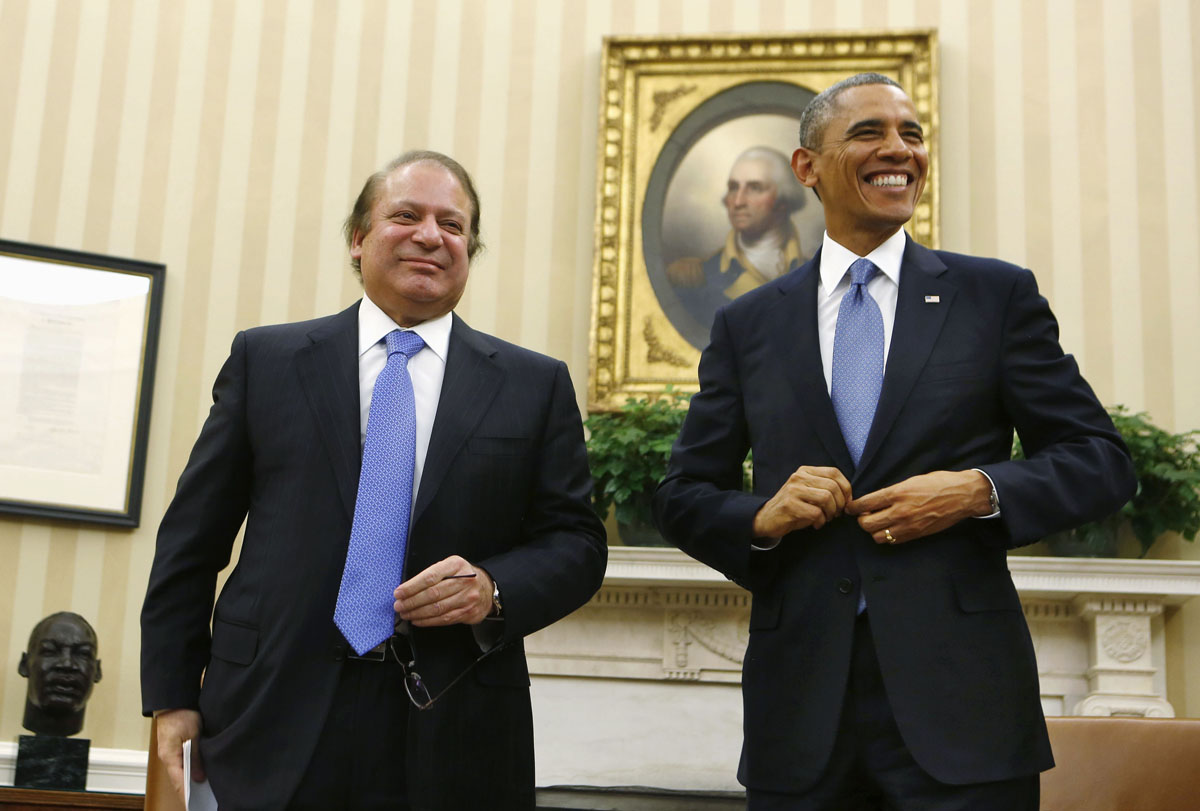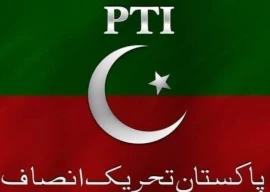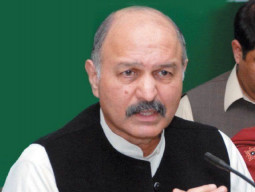
Speaking next to Obama in the Oval Office at the White House, Nawaz said he "brought up the issues of drones during our meeting, emphasising the need for an end to such strikes."
Obama did not mention drones when addressing reporters. But in a joint statement, the two leaders said their partnership was "based on the principles of respect for sovereignty and territorial integrity."
Obama also tried to reassure Pakistan on the status of Afghanistan, where US combat forces plan to withdraw next year.
Obama said he was "confident" of a solution "that is good for Afghanistan, but also helps to protect Pakistan over the long term."
Obama hailed Pakistan's sacrifices from extremism. More than 40,000 Pakistanis have died in attacks over the past decade.
"I know the Prime Minister is very much committed to try to reduce this incidence of terrorism inside Pakistan" and also wants to stop its export, Obama said.
Obama acknowledged tensions and "misunderstandings" between the two countries. He said the two leaders had pledged to work together on security issues in ways that "respect Pakistan's sovereignty."
"We committed to working together and making sure that rather than this being a source of tension between our two countries, this can be a source of strength for us working together," Obama said.
Speaking to reporters later, Nawaz said that it was imperative that Pakistan puts its house in order first.
Nawaz said that Obama had brought up issues relating to Dr Shakil Afridi, Jamat-ud-Dawa, and trial of alleged involved persons in Mumbai attacks. On the other hand, he said he raised issues pertaining to release of Dr Aafia, and highlighted the Kashmir issue.
The premier said that a number of bilateral economic and trade opportunities were discussed including cooperation to address Pakistan's energy crisis, scholarships and the Turkmenistan-Afghanistan-Pakistan-India (TAPI) gas pipeline.
Strategic dialogue slated for March 2014
One of the outcomes of the meeting was the definitive revival of strategic dialogue between US and Pakistan with March 2014 set for resumption of meetings.
“Both leaders welcomed the resumption of the US-Pakistan Strategic Dialogue and reaffirmed its importance as the suitable framework for guiding the bilateral relationship,” a readout from the joint statement read.
The discussed the forthcoming Ministerial-level Strategic Dialogue, which Secretary Kerry would be hosting in Washington by March 2014, will focus on people-centered initiatives and on results-oriented outcomes in support of the long-term stability, prosperity, and security of both the United States and Pakistan.
In addition to that, the two countries also decided on the strategic priorities for the five working groups including: 1) Law Enforcement and Counterterrorism; 2) Economics and Finance; 3) Energy; 4) Security, Strategic Stability, and Non-Proliferation; and 5) the Defense Consultative Group.
Future of Afghanistan
With a military and political transition in Afghanistan in 2014, Pakistan is the one that stands to be affected the most.
While Nawaz reiterated Pakistan’s oft repeated policy of non-interference and interest in a peaceful, stable, independent and united Afghanistan. A policy supported by Obama.
The premier also underlined that the support of the international community in the repatriation of Afghan refugees from Pakistan and their reintegration in Afghanistan was of critical importance to Pakistan.
While both affirmed their commitment to the Afghan-led and Afghan-owned political transition and the peace and reconciliation process in Afghanistan, Obama said that he would keep Nawaz fully briefed on the process.
“I pledged to fully brief the Prime Minister and his government in not only Afghan elections, but also a long term strategy for stability in the region.”
Both leaders called on the Taliban to join the political process and enter into dialogue with the Afghan government.
They shared their mutual conviction that a stable and peaceful Pakistan-Afghanistan border was important for the success of counterterrorism, counterinsurgency, and counter-IED efforts, and they underscored the critical significance of effective border coordination mechanisms between Pakistan and Afghanistan in achieving these objectives.
Nuclear security
With Pakistan’s nuclear safety being called in to question in recent times, President Obama reiterated his confidence in Pakistan’s commitment and dedication to nuclear security and recognised that Pakistan is fully engaged with the international community on nuclear safety and security issues.
Both leaders emphasised that nuclear terrorism is one of the most challenging threats to international security.
Obama appreciated Pakistan’s constructive engagement with the Nuclear Security Summit process and its cooperation with the International Atomic Energy Agency and other international forums, while acknowledging Pakistan’s efforts to improve its strategic trade controls and enhance its engagement with multilateral export regimes.
Ties with India
With violent incidents along the disputed Line of Control threatening peace between nuclear-tipped neighbours Pakistan and India, President Obama welcomed the recent engagements between Nawaz and his Indian counterpart Manmohan Singh.
Obama expressed the hope that this would mark the beginning of a sustained dialogue process between the two neighbours, aimed at building lasting peace in South Asia and resolving all outstanding territorial and other disputes through peaceful means.
He welcomed steps taken by Pakistan and India to improve their economic relations, including by exploring electricity and gas supply agreements, developing a reciprocal visa regime, and expanding bilateral trade.
Later Nawaz recalled that he had raised the issue of Kashmir with Obama.
In the end, both leaders committed themselves to remaining in close contact and to continuing their efforts to build a strong, broad-based, long-term, and enduring relationship between the two countries.
Following the meeting, Nawaz left for Andrews Air Force base to fly back to Pakistan.
COMMENTS (35)
Comments are moderated and generally will be posted if they are on-topic and not abusive.
For more information, please see our Comments FAQ

1730959638-0/trump-(19)1730959638-0-165x106.webp)




1723647989-0/Abu_dhabi_skylines_2014-(1)1723647989-0-270x192.webp)










@just_someone: also notice that OBAMA hiding his tie giving an impression it is of different color !
@np: "Briefing" is for team members. Atleast Obama did not say; I will "inform" you! To NS.
@nep: Headly was Indian.
Actually the scheme backfired like always.
"While both affirmed their commitment to the Afghan-led and Afghan-owned political transition and the peace and reconciliation process in Afghanistan, Obama said that he would keep Nawaz fully briefed on the process."
This means that Nawaz will not be part of the process. If he were, there would be no need for Obama to brief him. Not sure if that means Pakistan is not part of the process or that Obama will deal with Pakistani COAS directly because civilians cannot deliver anything.
@@Virkaul: "“Two of the conspirators of Pakistani origin were also US citizens” does that make the U.S responsible? then why Pakistan?"
BEcause US prosecuted HEadley and PAkistan refuses to prosecute those involved. Also Headley's sworn testimony in th court that he was working with LeT and an ISI major. Besides that there was an Indian who worked on 26/11 who was given Pakistani passport and sent to KSA. Once the proofs were provided to Saudi government by India he was handed over to India despite Pakistan's protests that he was Pakistani.
Just because the citizen of a country does a negative act, it does not mean the country is involved. But if the country fails to hold that person accountable or even worse it can be proved that the country's leadership was involved in planning these activities then of course the country is held responsible.
@Very sorry for you:
Simple - IK's constant anti USA blather. Being the President or PM of Pakistan doesn't guarantee you an audience with the President - ask Zardari or Gilani who have both been flatly refused when trying to meet with Obama (even on the sideline of international meetings).
"Two of the conspirators of Pakistani origin were also US citizens" does that make the U.S responsible? then why Pakistan?
I still believe pm NS will be more forthcomming and honest with Obama & Pak public than any other leader we have sent there in past. That's where I trust him.
@Zaida P: And why it happens everytime? I wonder. Actually its a friendship killer...why Obama even brought that up? How many Indians he got on his advisery panel? Now NS won't hear anything else comming from him. @Raj - USA: man in blue turban just shows he is for peace. @Noman: Oh, the smile is about the roast lamb Obama sent to his room for dinner last night. @vaticancity: Saudia would say; atleast the money is coming "into" your country, you don't have to pay back, lol. @ModiFied: Obama said: That's just a mini war, you want us to rage a full fledged war? @Rex Minor: PM NS only believed the part of speech related to Pak to get our house in order first. @just_someone: Tie coordination is a random act. Although it set good start for the day, such things happen by chance too often.
@unbelievable: IK can meet the royals of UK in his personal capacity, what makes you think he would not he invited to US as a PM of Pakistan? A person of IK's calibur would have easily brought so much respect to Pakistan. If US is giving aid to Pakistan, its not on anyone's face value, be it NS or IK. Its the cost of their war, 40000 Pakistanis and some dollars to compensate that, its not inconvenient at all. There is no such thing as friendship as far as country to country aid and relationship is concerned. And this aid is never a gift for Pakistan its rather a give and take. And US does have too much interests in what she takes from Pakistan. Its our politicians' failure that they can't bargain well in exchange. Also atleast IK values the lives of Pakistanis unlike others who have given their agreement to their drone attacks and as a result the terrorists make it a reason to attack and kill more Pakistanis. Stick to these policies and it will take us to nowhere just like we have been heading to nowhere at a great pace since last so many years. And yes, don't know how getting the loans from IMF is an achievement for NS. All they have done is caused further menace to Awam, further devalued rupee, so many added taxes and inflation to name a few. While we are not even sure these taxes or even the loans would be used for the welfare of the country or the rulers. I am not trying to knock you off with my arguments but I simply disagree with you, and that I just don't get how these twice failed politicians still manage to get the faith of educated class in them.
@Umar:
IK wouldn't have been invited. You wouldn't have gotten IMF loan or aid from USA and it's likely USA would have shut off trade and you would be sitting in the dark without power. job or hope - wondering why IK promises to turn around country in 90 days didn't work.
Imagine IK visiting US instead of Nawaz as PM of Pakistan, everyone at their end would have been way more calculated in any stance and words they choose, its clearly not the case with NS. It would have been way more graceful. Shame, it didn't happen. You can't expect anything from twice tried and failed NS.
Well done Nawaz, i hope this tie diplomacy works. same ties, looks like Nawaz and Shahbaz are sitting :).
@Zaida P: American and Israeli citizens also lost their lives in that attack. Two of the conspirators of Pakistani origin were also US citizens. That is why.
@Syed A. Mateen: Just a day before the meeting between Nawaz Sharif and Obama, the White House spokes-person Jay Carney had pre-emptively rejected the Pak PM challenge on drone attacks stating that drone attacks are precise, lawful and effective. This news was blacked out by most Pak dailies including ET as well as the TV channels in Pakistan.
@Pasanni: "Aiding militants"? When did Dr.Afridi aid militants? Is there no limit to the lying?
"Jamat-ud-Dawa, and trial of alleged involved persons in Mumbai attacks" The above line is the most damning indictment of the failure of Pakistan's narrative. What does the Mumbai attacks have to do with US-Pakistan bilateral talks? The fact that the President of the United States brought that up shows who he is leaning towards. Good luck with expecting anything fruitful for Pakistan.
lol @ same ties
@just_someone: I am guessing NZ might have brought that tie as a gift for Obama. The ties aren't exactly similar though.
the real issue is economic engagement with the powerhouse of the world. can the engagement be substantial? reading from the happy faces the answer seems to be emphatic yes. if only millions can be brought out of massive poverty, Pakistan will survive. i am hopeful about it as china and india have shown that it can be done. but yes, talking about Drone all the time keeps hungery masses engaged for awhile. but sooner or later, roti, kapda will acquire the centre stage and all else will frankly cease to matter.
There was not even a mention of his visit in any of the major news networks. There might have been some passing comments which I didn't see on TV. It appears Nawaz was summoned here by Obama for little chat and advise plus a little scolding. Nawas says he told Obama to stop drones and settle Kashmir issue right the way. Nawaz's body language reveals the unpleasant scolding he received.
@just_someone: Blue color is for Obama's party "Democratic Party". Color for Republicans is red. Even during the meeting with John Kerry, NS was wearing blue tie. Kerry was wearing green tie, color of Islamic Republic of Pakistan.
http://tribune.com.pk/story/620313/nawaz-meets-kerry-emphasizes-need-for-bilateral-relations/
Now, don't bring in blue turban because Manmohan Singh always wears blue turban, whether he is in India or meeting Obama or Saudi King. He is known as the Sardar with blue turban.
@Zain, You have some serious issues with a kind of a complex(I am putting it politely),perhaps trying hard to get noticed,so to be in good books.
It is really great for Pakistan Prime Minister to believe in what he heard from the American supremo. The European allies however, do no longer believe in him and are going to hold him responsible for the break-up of the North Atlantic alliance because of the NSA spying activities not only on European industry but its citizens. The recent one on French citizens and on Mrs Merkel, the German chancellor is no longer acceptable and this has been conveyed to him over the phone..
Rex Minor
"partnership was “based on the principles of respect for sovereignty and territorial integrity.” Does respect for sovereignty of the other nations includes not sending non state actors across the border? Look at MNS he is holding his report card in his hand and list of home work (do more) from the Principal. MNS body language tells all that he received the lecture from the other side.
US has spoken about the principles of respect for sovereignty and territorial integrity of Pakistan but not for a single moment spoke about the drone attacks on Pakistan.
US President is confident of a solution that is good for Afghanistan, but also helps to protect Pakistan over the long term.
US wants to strengthen US-Pakistan relationship and cooperation in a number of fields that also include release Dr Shakil Afridi from Pakistani jail.
US would assist Pakistan in speeding up its economic development.
US announced the resumption of about $1.6 billion economic and security assistance for Pakistan, which could not be delivered in the recent years.
US is ready to do every thing, but would not like to halt the drone attacks on Pakistan.
This is how US respects Pakistan's sovernity and interigity.
If drone attacks are not halted, it means that US is not serious with Pakistan and this is merely a lip service nothing more.
Regret the US policy makers are misguiding the US President and are unable to assess the future relations between Government of Pakistan and US.
I dont have much hope that people of Pakistan will ever be able to change their minds about US policies and will keep on reacting in the same way as before.
Proof will be in the pudding!
Am I the only one who is noticing the matching ties?? Weird since its not a thing heads of states do when meeting each other. I wonder which side initiated the request for coordinated ties!
With Such Happy Faces.... "Nawaz urges Obama to end drone strikes"
Hey Mr Sharif can you actually tell Saudi Arabia to stop sending or paying hired militants to create problems in Pakistan and other countries please as they are actually the ones causing alot of problems.
"Nawaz urges Obama to end drone strikes"
What did Obama say ? Any assurance he gave that there won't be any more drones? How long the photo session lasted ?
That great flag in the background. Love it
Hay hay,, tell me one thing please and make it clear.. As far as i know Afridi has been imprisoned for aiding militants as the documents of the judgement by the tribal court reveal.. Pak govt never said Afridi has been imprisoned for aiding CIA to hunt down OBL... neither said Afridi doing so... then Obama discussing Afridi's release..why???